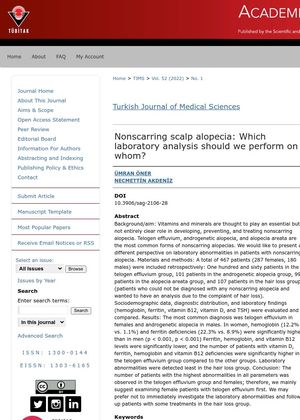Nonscarring Scalp Alopecia: Which Laboratory Analysis Should We Perform on Whom?
January 2021
in “
Turkish Journal of Medical Sciences
”

TLDR Women with telogen effluvium should be tested first for vitamin and mineral deficiencies.
The study, conducted on 467 patients (287 females, 180 males) with nonscarring alopecia, aimed to understand the role of vitamins and minerals in the development, prevention, and treatment of this condition. The most common diagnosis was telogen effluvium in females and androgenetic alopecia in males. The study found that women had significantly higher deficiencies in hemoglobin (12.2% vs. 1.1%) and ferritin (22.3% vs. 8.9%) than men. Furthermore, patients in the telogen effluvium group had significantly lower levels of ferritin, hemoglobin, and vitamin B12, and a higher number of patients with deficiencies in vitamin D, ferritin, hemoglobin, and vitamin B12 compared to other groups. The least laboratory abnormalities were detected in the hair loss group. The study concluded that the highest abnormalities in all parameters were observed in the telogen effluvium group and females, suggesting that female patients with telogen effluvium should be examined first.


